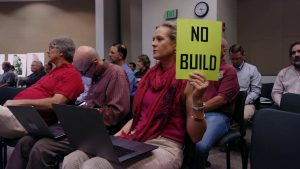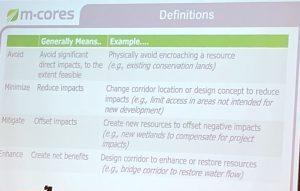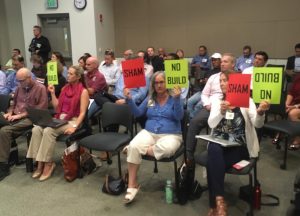On Nov. 13, I joined 1000 Friends of Florida as a presenter for its webinar, Covering All the Bases: Effective Engagement in the M-CORES Process. I discussed ways to be engaged and fight the Roads to Ruin.
You can watch the entire webinar here:https://1000fof.org/m-cores-webinar/
I shared six ways that the public can be engaged in the M-CORES process. Here’s what I recommend:
Attend Task Force meetings
These meetings are open to the public and are typically held from 10 a.m. to 4 p.m. with a public comment period at 4:30 p.m. Florida Department of Transportation (DOT) also holds community open houses at various locations within each of the toll road study areas. These community open houses are like a science fair, with DOT staff and consultants available to answer questions and take written public comments. A calendar can be found here: https://floridamcores.com/calendar-of-events/
Submit comments to FDOT in multiple formats
You can submit and present public comments at both the task force meetings and open houses. Don’t have time to attend? You can send your comments with one quick click using our Take Action portal.
Organize members in your community
We are stronger together. Host a meeting at your home or community center and invite your neighbors to discuss the issue, plan questions and develop public comments. You can share our resources. By seeking additional voices, we can show different perspectives on the toll roads.
Idea: organize a letter-writing party to submit LTEs to your local newspapers.
Many communities have a direct stake in these roads including nature lovers, hikers and bikers, horseback riders, and hunters and anglers. While environmental issues are front of mind for FCV, business interests also need to be at the table. You can talk to your local chambers of commerce and small business groups about their concerns or ideas.
Be knowledgeable
The Toll Road Task Forces and DOT speak a complicated language. Knowing what terms like avoid, minimize, mitigate, and enhance, really mean in the context of these roads is important. See definitions at right.
Hold your state officials accountable and talk with them
While this legislation is on the fast track, that doesn’t mean it’s a done deal. The task forces will submit recommendations to the Governor and Legislature on October 30, 2020. Additional appropriations will be necessary to fund the project, meaning that there are plenty of opportunities to influence the process. Speak with your state-led officials and tell them to vote against any new funding for these roads to ruin.
And don’t forget your local County Commissioners. Many are members of the task forces and your input can help shape their recommendations. For those in the study counties, ask your commission to pass an amendment to the comprehensive plan that designates natural resource protection areas, like springsheds or farmland preservation.
Stay up to date on developments and share far and wide
Set a Google Alert for “M-CORES” and check regularly for articles in your local and statewide media sources. Share articles with friends and neighbors and submit your own comments.
The three proposed Roads to Ruin will change the face of Florida forever, paving over our rural communities, water supply, and remaining natural spaces. If we want a future of responsible growth and plentiful resources, we must act now to stop these toll roads in their tracks. We need your voice and support before it’s too late.
Thank you for standing up for Florida.

